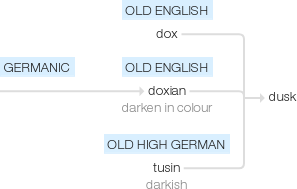Dusk
Old English dox ‘dark, swarthy’ and doxian ‘darken in colour’, of Germanic origin; related to Old High German tusin ‘darkish’; compare with dun1 The noun dates from the early 17th century The change in form from -x to -sk occurred in Middle English.
wiktionary
From Middle English dosk, duske(“dusky”, adj.), from Old English dox(“dark, swarthy”), from Proto-Germanic *duskaz(“dark, smoky”), from Proto-Indo-European *dʰuh₂s- (compare Old Irish donn(“dark”), Latin fuscus(“dark, dusky”), Sanskrit धूसर(dhūsara, “dust-colored”)), from Proto-Indo-European *dʰewh₂-(“smoke, mist, haze”). More at dye. Related to dust.
etymonline
dusk (n.)
"partial darkness, state between light and darkness, twilight," 1620s, from an earlier adjective dusk, from Middle English dosc (c. 1200) "obscure, not bright; tending to darkness, shadowy," having more to do with color than light, which is of uncertain origin, not found in Old English. Middle English also had it as a verb, dusken "to become dark." The Middle English noun was dusknesse "darkness" (late 14c.).
Perhaps it is from a Northumbrian variant of Old English dox "dark-haired, dark from the absence of light," with transposition of -k- and -s-, (compare colloquial ax for ask). But OED notes that "few of our words in -sk are of OE origin." Old English dox is from PIE *dus-ko- "dark-colored" (source also of Swedish duska "be misty," Latin fuscus "dark," Sanskrit dhusarah "dust-colored;" also compare Old English dosan "chestnut-brown," Old Saxon dosan, Old High German tusin "pale yellow").
